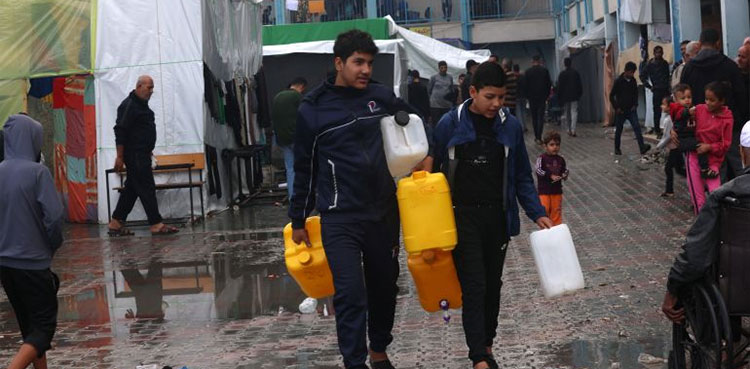
UNITED NATIONS: United Nations High Commissioner for Human Rights Volker Turk Thursday welcomed the Security Council’s call for pauses in the fighting in the Israeli-imposed siege Gaza where “doctors operate on screaming children without anaesthetic, using mobile phones for light”, before appealing directly to the warring sides to lay down their weapons.
Speaking to reporters in Geneva, the UN rights chief urged the parties to the conflict to “create the political space for a path out of this horror”.
Turk condemned the widespread targeting of civilians in the past five weeks of hostilities and urged accountability for gross rights violations.
He stressed that attacks directed at “hospitals, schools, markets and bakeries” as well as collective punishment “in the case of Israel’s blockade and siege imposed on Gaza” are prohibited under international humanitarian law.
So too is “aiming indiscriminate projectiles into southern Israel” by Palestinian fighters hostage-taking.
“I am on the side of every civilian, Palestinian or Israeli, who is harmed, or who lives in fear,” he said.
Addressing the desperate humanitarian situation in the enclave after briefing Member States and journalists in Geneva, Turk highlighted multiple patient deaths at Gaza City’s besieged Al-Shifa hospital and the proliferation of attacks on healthcare in the Strip.
Since October 7, 137 such attacks have been documented by the UN health agency WHO.
The UN rights chief spoke of people forced to move south by Israeli bombardments and fighting on the ground, “carrying elderly family members, and terrified, sometimes wounded children, moving slowly on a bomb-cratered road”, and of those unable to move who remain trapped in sealed-off northern Gaza.
Putting hostilities on hold to give space to humanitarian action, as called for by Security Council resolution 2712 adopted on Wednesday night, is “critically necessary”, Turk said, urging the parties to the conflict to “give effect, immediately, to the Council’s calls”.
The High Commissioner echoed the 10-point plan presented on Wednesday by UN emergency relief chief Martin Griffiths, notably regarding the need to provide fuel to power aid trucks, hospitals, bakeries and desalination plants.
In alignment with Mr. Griffiths’ comments, Turk warned that proposals for a so-called “safe zone” are untenable” because the zone is “neither safe nor feasible for the number of people in need”.
War crimes investigations
Speaking to journalists of the need for justice and accountability, he said that documenting and analysing evidence of all violations was a long and necessary process.
He stressed the importance of access to both Israel and the occupied Palestinian territory for independent monitoring. Where national authorities “prove unwilling or unable” to carry out investigations, and “where there are contested narratives on particularly significant incidents” an international investigation could be called for, he said.
Asked about the case of Al-Shifa hospital, which was the object of an Israeli military raid this week, he said that there were contradictory statements on the developments there, which would warrant an independent international investigation “to find out what is actually happening”.
The Israeli occupation forces raided the hospital claiming that Hamas had established a command centre under the hospital – an allegation denied by medical staff.
Turk also stressed that the crisis “extends well beyond Gaza”, with a “potentially explosive” situation in the occupied West Bank, where settler attacks against Palestinians and the use of military means in law enforcement operations are on the rise.
Having returned from a visit to the region last week, the UN rights chief also said that he shared “the deep sense of foreboding of many of [his] interlocutors about the risk of spillover into the wider Middle East region, if the current trajectory continues”.
He warned against the “trap” of further polarisation, insisting that “every one of us needs to strive to find common ground, and a solution”.
from International News Today - Breaking News, US News, World News https://ift.tt/rt7pvY5




Social Plugin